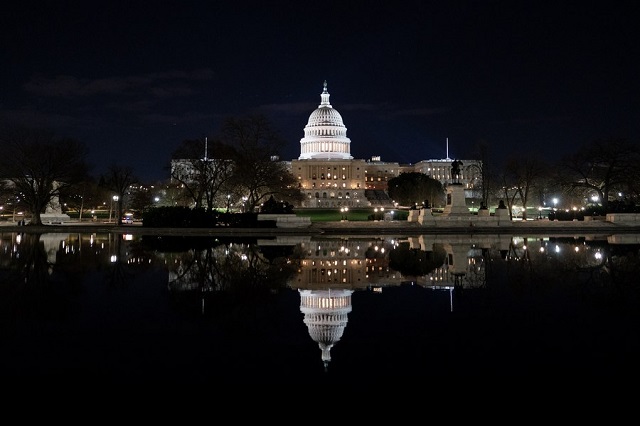
BEIJING, China | Xinhua | The United States recently encouraged its Group of Seven (G7) allies to revive discussions about China’s “overcapacity” in a communique following a meeting of finance ministers and central bank governors. This move came after Washington substantially raised import tariffs on a host of clean energy products from China.
Washington’s bid for a “protectionism alliance” blatantly disregards facts and economic principles, disregards open and win-win cooperation, jeopardizes global consumer welfare and undermines the global transition to clean energy sources.
Currently, global demand for clean energy capacity far exceeds supply. What threatens global efforts to tackle climate change is not too much but too little high-quality clean energy capacity. The U.S. attempt to suppress China’s clean energy industry essentially undermines the future of the earth and its inhabitants.
The advancement of China’s clean energy sector is the result of open competition. It stems from an adaptation to industrial transformation trends, and a steadfast commitment to green and low-carbon development. The foundation for its growth lies in a well-established industrial and supply chain system, robust industrial support capabilities, abundant and high-quality human resources, and other manufacturing assets. Its sustained momentum derives from a market competition that fosters technological breakthroughs and innovative business models.
As Wichai Kinchong Choi, senior vice president of leading Thai bank Kasikornbank, has noted, Chinese enterprises’ commitment to R&D and innovation and their successful cost control have given their products a competitive advantage in the global market.
“Given their desirable quality and affordable price, Chinese enterprises’ products are naturally loved by consumers all over the world,” Choi said.
The notion of China’s “overcapacity” in new energy is unfounded and will only hinder the global green transition and the development of emerging green industries.
Overwhelmed by anxiety over China’s advancement in the renewable energy industry, Washington imposed massive tariffs and pressured allies to follow suit under the guise of combatting “overcapacity.”
U.S. protectionism masked as “fair competition” undermines the global multilateral trading system and serves solely U.S. obsession with hegemony.
Ironically, the United States itself exemplifies the “non-market policies” it blatantly criticizes. Discriminatory policies, represented by the “CHIPS and Science Act” and the “Inflation Reduction Act,” provide subsidies to specific sectors while barring products from WTO members.
These actions distort fair competition, disrupt global supply chains, and violate WTO rules, including national and most-favored-nation treatment principles. Such practices have undermined a fair trade environment and drawn criticism from the international community, including U.S. allies.
Despite the United States’ hysterical push for a “unified front” against China’s green industries, Europe isn’t buying it. European nations are wary, seeing Washington’s stance as a recipe for trade wars and deeper global divides.
After Washington announced a 100 percent tariff against made-in-China EVs, Italian Economy and Finance Minister Giancarlo Giorgetti said that a “trade war” was being fought and warned of the risk of “fragmentation” to global commerce.
German Chancellor Olaf Scholz pointed out that at least half of EV imports from China to Europe were of locally-produced Western brands.
“We should not forget: European manufacturers, and also some American ones, are successful on the Chinese market and also sell a lot of vehicles that are produced in Europe to China,” Scholz said.
Germany Finance Minister Christian Lindner told reporters at the G7 meeting that “trade wars are all about losing; you can’t win them.” Lindner said that EU countries must react to dumping and unfair practices but must not weaken free and fair global trade.
“We should definitely avoid any kind of trade wars, because the trade war is neither in the interest of the U.S., nor China, nor Europe, nor any country in the world,” Bruno Le Maire, France’s Minister of Economy, Finance and Industrial and Digital Sovereignty, told reporters.
It’s not just America’s European allies who harbor doubts: There’s plenty of skepticism at home.
“America’s new protectionist stance will raise prices, limit consumer choices and risk our growth,” said Steven Rattner, counselor to the Treasury secretary in the Obama administration, in a recent New York Times opinion piece.
“I’m hoping that when the election dust settles, we can get back to what David Ricardo explained so clearly two centuries ago,” Rattner said, referring to Ricardo’s 200-year-old theory of comparative advantage: The idea that by specializing in the products that they can produce most efficiently and then trading with others, nations can be better off.
On Thursday, Tesla CEO Elon Musk said he opposed U.S. tariffs on Chinese electric vehicles (EVs). “Neither Tesla nor I asked for these tariffs. In fact, I was surprised when they were announced,” Musk said. “Things that inhibit freedom of exchange or distort the market are not good.”
“The U.S. Should Stop Playing the Victim Over China Trade,” reads the title of an article published on May 16 by Foreign Policy magazine, which argues that it isn’t too late for Washington to shift strategies as “the United States is tremendously outcompeted by China in batteries and EVs” in terms of cost, quality and innovation.
Trade protections of this scope would have been almost unthinkable even half a generation ago, David Wallace-Wells, opinion writer at The New York Times, said in his Wednesday contribution.
“E.V. protectionism looks less like a market tweak, designed to even the playing field for American automakers, than a market wall. It’s designed to keep Chinese exports entirely out of the United States,” Wallace-Wells wrote.
If history is any guide, protectionism protects nothing but stagnation. The U.S. pursuit of a “protectionist alliance” is a surefire way to sabotage global economic and ecological health. U.S. short-sightedness and double standards won’t solve its industrial woes but will likely deepen global economic fractures. ■
 The Independent Uganda: You get the Truth we Pay the Price
The Independent Uganda: You get the Truth we Pay the Price



